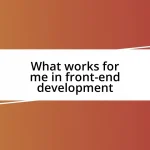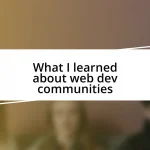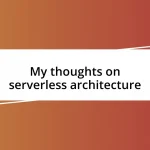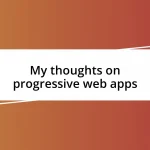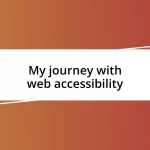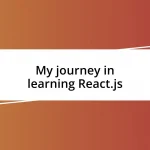Key takeaways:
- Web development communities foster belonging, collaboration, and mentorship, enabling personal and professional growth through shared experiences and resources.
- Online platforms like GitHub and Discord enhance learning and connection among developers, encouraging participation in projects and hackathons that stimulate creativity.
- Engaging in local web dev groups and open-source projects provides invaluable networking, immediate feedback, and diverse perspectives, reinforcing the importance of community support in the learning process.

Understanding web development communities
Web development communities are vibrant ecosystems where passionate individuals converge to share knowledge and experiences. I remember my first encounter with an online forum; it was like stepping into a digital café where everyone spoke the same language but had their unique stories to tell. Have you ever felt a sense of belonging just by interacting with like-minded people?
Within these communities, you’ll find an abundance of resources, from tutorials to project showcases, that can spark creativity and inspire growth. I’ve often found myself diving deep into discussions, not just learning new coding techniques, but also getting insights into the emotional ups and downs of the development process. It made me realize that we all face similar challenges—doesn’t that create a powerful bond?
Moreover, the diversity in skill levels allows for mentorship and collaboration, which can be profoundly rewarding. I recall a time when a novice coder reached out for help on a project; guiding them through the struggle reminded me of my early days. There’s something magical about witnessing someone else’s journey unfold, don’t you think? It’s moments like these that highlight the importance of support in these communities, making them a cornerstone for personal and professional growth.

Online platforms for developers
Online platforms for developers serve as essential hubs where learning and collaboration thrive. I fondly remember the excitement of logging onto GitHub for the first time; it felt like entering a treasure trove of open-source projects just waiting to be explored. Engaging with peers through comments and pull requests not only expanded my coding skills but also built lasting connections with fellow developers who shared my passion.
Here are some popular online platforms that developers frequently use:
- GitHub: Not just a repository, it’s a community for collaboration and code sharing.
- Stack Overflow: A go-to place for troubleshooting where developers help each other tackle coding questions.
- CodePen: A wonderful space for front-end developers to showcase their work and experiment with HTML, CSS, and JavaScript.
- Dev.to: A great community where developers share articles, tutorials, and insights on various tech topics.
- Discord: Often underappreciated, Discord hosts numerous servers where developers can chat in real-time, making for quick help and vibrant discussions.
In my journey, I’ve seen how these platforms break barriers and create a rich tapestry of knowledge and support. When I participated in a hackathon hosted on a Discord channel, the sense of shared urgency and enthusiasm was electric. Collaborating with others in real-time not only intensified my focus but also showed me how collective intelligence can lead to innovative solutions. It’s just one of those moments that reaffirmed my love for developer communities, where every click and conversation propels us further down the coding path together.

Joining local web dev groups
Joining local web dev groups can be a game-changer in your development journey. I still remember the first meetup I attended; walking into the cafe filled with excited chatter felt a bit daunting yet exhilarating. Once the ice was broken with a few friendly faces, I realized how much community can fuel not just skill-building, but genuine relationships. There’s something special about exchanging ideas face-to-face, don’t you think?
One aspect that truly surprised me was the variety of backgrounds people brought to the table. During one session, a graphic designer shared insights on UX that shifted my perspective on coding entirely. It made me appreciate how collaborative efforts can lead to innovative ideas. Have you ever found inspiration in unexpected places? For me, it was a reminder that learning doesn’t just happen in a silo; connecting with others can spark creativity in ways I hadn’t anticipated.
Lastly, the local web dev groups often highlight real-world projects and challenges, which is invaluable. I recall presenting a side project I was working on, and the feedback I received was transformative. I never expected a simple gathering to create such impactful discussions that really pushed my thinking. The camaraderie and support can genuinely elevate your projects and confidence, highlighting the power of community interaction.
| Aspect | Local Web Dev Groups |
|---|---|
| Networking Opportunities | In-person connections foster lasting relationships. |
| Immediate Feedback | Real-time discussions provide direct responses to questions. |
| Diverse Perspectives | Learn from individuals in different areas of expertise. |
| Motivation & Accountability | Being part of a group can motivate continuous growth. |

Learning from open source projects
Engaging with open-source projects has been one of the most rewarding aspects of my coding journey. I remember diving into my first contribution—fixing a small bug on a project that had been around for years. The thrill of seeing my pull request merged felt exhilarating! It wasn’t just about writing code; it was about becoming part of something larger than myself, understanding the importance of collaboration and shared goals.
Through open-source, I learned how to navigate real-world coding challenges. Each project had its own unique set of requirements and tools, revealing just how dynamic web development can be. There was that one instance when I was stuck on a particularly tricky feature. I turned to the project’s issue tracker and found a discussion thread where others had faced the same problem. The guidance I received from seasoned developers not only helped me solve the issue but also deepened my appreciation for the mentorship within open-source communities. Have you ever experienced the satisfaction of being guided by someone who genuinely wants to help you grow?
The feedback loop in open-source is incredibly enriching. After working on a couple of projects, I started to receive constructive feedback on my code, which was sometimes tough to digest but always valuable. I remember a mentor pointing out cleaner ways to implement a function that I had worked so hard on. At first, I felt a twinge of disappointment, but reflecting on it now, I realize that it only pushed me to improve my skills. It made me realize that every piece of criticism is an opportunity to hone my craft. Isn’t that what learning is all about—embracing challenges and transforming them into growth?

Contributing to community discussions
Contributing to community discussions is where the magic really happens. I recall one late-night online chat where I nervously shared a design flaw I couldn’t figure out. The responses poured in, and not only did I get immediate suggestions on potential fixes, but I also felt a rush of support from fellow developers who had been in my shoes. Isn’t it amazing how a simple question can open the floodgates to a wealth of shared expertise?
Not every discussion is about seeking help, though. Occasionally, I find great satisfaction in sharing my own solutions to problems I’ve encountered. I once wrote a blog post after successfully implementing a challenging feature, detailing my process and the hurdles I overcame. The feedback was overwhelmingly positive, and seeing others inspired by my experience was incredibly rewarding. Have you ever had that moment when your knowledge genuinely helps someone else? It’s a beautiful reminder that in a community, your experiences can have a real impact.
Moreover, I’ve realized that contributing isn’t only about answering questions. Engaging in discussions allows me to stay updated on industry trends and emerging technologies, which can be invigorating. I remember an insightful conversation about the future of web frameworks that sparked my curiosity so much that I dove into researching the topic further. If not for that vibrant exchange, I might have missed out on discussions that set the direction for my learning journey. How often do we get a chance to connect ideas through collaborative conversation? It’s this potential for collective growth that makes contributing to community discussions so enriching.

